|
Books Should Be Free Loyal Books Free Public Domain Audiobooks & eBook Downloads |
|
|
Books Should Be Free Loyal Books Free Public Domain Audiobooks & eBook Downloads |
|
Comedies |
|---|
|
Book type:
Sort by:
View by:
|
By: John Kendrick Bangs (1862-1922) | |
|---|---|
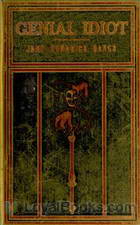 Genial Idiot
Genial Idiot
John Kendrick Bangs once again takes us on a journey with the loveable, but somewhat self-opinionated and irritating Mr Idiot. | |
By: John Leacock (1729-1802) | |
|---|---|
 The Fall of British Tyranny American Liberty Triumphant
The Fall of British Tyranny American Liberty Triumphant
| |
By: John Lydgate (1370?-1451?) | |
|---|---|
 Disguising at Hertford
Disguising at Hertford
| |
By: John Vanbrugh (1664-1726) | |
|---|---|
 Provoked Wife: A Comedy
Provoked Wife: A Comedy
This Restoration Comedy follows Lady Brute as she decides whether or not to cuckold her coarse and unloving husband. Not as brash and farcical as Vanbrugh's earlier play "The Relapse," "The Provoked Wife" comments on society and matrimony in a surprisingly modern way. - Summary by WendyKatzHiller Cast of Characters: Constant: Adrian Stephens Heartfree: Gred Giordano Sir John Brute: Alan Mapstone Treble, a Singing-Master : ToddHW Rasor, Valet de Chambre to Sir John Brute: Larry Wilson Justice of the Peace: Wayne Cooke Lord Rake, Companion to Sir John: Algy Pug Col... | |
By: John Wight (1866-1944) | |
|---|---|
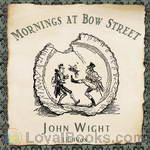 Mornings at Bow Street
Mornings at Bow Street
This is a collection of various articles found in Morning Herald columns. Some are found interesting, some may be hilarious! The 84 pieces of this book are actual reports throughout the 1870s newspaper written by the reporter, John Wight and Illustrated by George Cruikshank | |
By: Joseph Addison (1672-1719) | |
|---|---|
 Drummer, or, The Haunted House
Drummer, or, The Haunted House
Lady Truman received word fourteen months ago that her husband, Sir George Truman, has died in battle. Now a very eligible widow with a large estate, she has more suitors than she knows what to do with. As if that wasn't enough, her house is now being haunted at night by the horrible and ghostly sound of a drum, apparently caused by the restless spirit of her husband. When an old man arrives who claims to be able to lay the spirit to rest, she is so desperate for relief that she determines to give him a chance... | |
By: Josephine Van Tassel Bruorton | |
|---|---|
 Summer Boarders; or The Great Jewel Mystery
Summer Boarders; or The Great Jewel Mystery
A rich widow or two. An owner of 1000 acres of fine land. An heiress to the 1000 acres. Nefarious visitors of various sorts after the land, jewels, or whatever else they can get. Meddlers and neighbors. Faithful retainers and stalwart protectors. Comedy abounds. - Summary by ToddHW Cast list: Joshua Wicks, owner of "close onto 1,000 acres": Wayne Cooke Mr. Peter Schultz, sometimes vendor of sausages: Greg Giordano Mr. Barry Bland, an Englishman possessed of a shady reputation and a talkative... | |
By: Lawrence Echard (1670?-1730) | |
|---|---|
 Prefaces to Terence's Comedies and Plautus's Comedies (1694)
Prefaces to Terence's Comedies and Plautus's Comedies (1694)
| |
By: Lechmere Worrall (1874-1957) | |
|---|---|
 Ann
Ann
Edward Hargraves, a young author, is encouraged by his mother and friend, Billy, to marry a woman in order to understand the fairer sex better and thereby characterize them better in his next book. While he attempts to follow their advice and marry Evangeline, a pleasant but rather uninteresting woman, a daring American reporter has set her eyes on him. She will stop at nothing to interview him and attract his attention. - Summary by Elsie Selwyn Cast List: Rev. Samuel Hargraves: ToddHWEdward Hargraves: Campbell SchelpWilliam “Billy” Lloyd: RHelfmannMrs. Hargraves: Anita Sloma-MartinezEvangeline Lipscomb: thestorygirlAnn Anning: EmmaHattonStage Directions: Elsie Selwyn Edited by: linny | |
By: Lillian Sutton Pelée (1872-1948) | |
|---|---|
 Wives on Strike
Wives on Strike
The "Wives' Welfare Club" is meeting together so they may air grievances about their husbands and the inequality that women experience. During this meeting the wives decide to "go on Strike" and nominate Jane Spink to be the test case. Betty, who is a newlywed of only 30 days, boasts of her husband's perfect qualities and is amused at the other wives' complaints. However, as she returns home she realizes she just might end up on strike as well! - Summary by Jenn BrodaCast List: Betty Albright,... | |
By: Lording Barry (1580-1629) | |
|---|---|
 Ram Alley, or Merry Tricks by Lording Barry
Ram Alley, or Merry Tricks by Lording Barry
Ram Alley, or Merry Tricks, is a bawdy comedy by Lording Barry, a contemporary of Shakespeare. The production bankrupted Barry, landed him in debtor's jail, and set him off on a life of piracy. The action of Ram Alley takes place in a disreputable London lane where lawyers, lords, and ladies rub shoulders with prostitutes and vagabonds. One 19th century editor complained that it was "full of gross passages, allusions, and innuendoes," but more recent commentators have seen past the risque gags and recognised the play's wit, complexity, and intelligence... | |
By: Madeleine Lucette Ryley (1858-1934) | |
|---|---|
 Mice and Men
Mice and Men
No, not the famous “Of Mice and Men” you’re thinking of. Instead, we have a sweet romantic comedy that tells the story of a bachelor, Mr. Embury, who decides to conduct an experiment to see if he can create the perfect wife for himself. To do so, he chooses an orphaned girl named Peggy to become his ward and ultimately his wife. Peggy, however, thinks that Mr. Embury has plans for her to become the wife of his nephew, Captain Lovell, whom she believes is in love with another woman . A critic who was not fond of sentimental stories called this play a fairy story with a sincere spirit and one they could actually believe in... | |
By: Mark Ambient (1860-1937) | |
|---|---|
 Oh! Susannah! A Farcical Comedy in Three Acts
Oh! Susannah! A Farcical Comedy in Three Acts
| |
By: Mark Twain (1835-1910) | |
|---|---|
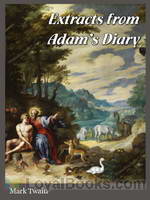 Extracts from Adam's Diary
Extracts from Adam's Diary
Get the true story of Adam and Eve, straight from the source. This humorous text is a day-to-day account of Adam’s life from happiness in the “GARDEN-OF-EDEN” to their fall from grace and the events thereafter. Learn how Eve caught the infant Cain, and Adam takes some time to learn exactly what it is. | |
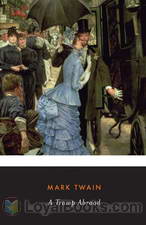 A Tramp Abroad
A Tramp Abroad
A Tramp Abroad is a work of non-fiction travel literature by American author Mark Twain, published in 1880. The book details a journey by the author, with his friend Harris (a character created for the book, and based on his closest friend, Joseph Twichell), through central and southern Europe. While the stated goal of the journey is to walk most of the way, the men find themselves using other forms of transport as they traverse the continent. The book is often thought to be an unofficial sequel to an earlier Twain travel book,The Innocents Abroad... | |
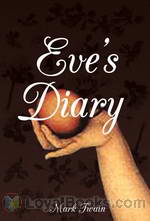 Eve's Diary
Eve's Diary
Eve's Diary is a comic short story by Mark Twain. It was first published in the 1905 Christmas issue of the magazine Harper's Bazaar, and in book format in June 1906 by Harper and Brothers publishing house. It is written in the style of a diary kept by the first woman in the Judeao-Christian creation myth, Eve, and is claimed to be "translated from the original MS." The "plot" of this novel is the first-person account of Eve from her creation up to her burial by, her mate, Adam, including meeting and getting to know Adam, and exploring the world around her, Eden... | |
 Mark Twain's (Burlesque) Autobiography and First Romance
Mark Twain's (Burlesque) Autobiography and First Romance
Mark Twain's (Burlesque) Autobiography and First Romance, a short volume, published by Sheldon & Co., NY in 1871, is Mark Twain's third book. It consists of two stories - First Romance, which had originally appeared in The Express in 1870, and A Burlesque Autobiography (bearing no relationship to Twain's actual life), which first appeared in Twain's Memoranda contributions to the Galaxy. Rather, the content consists of a few short stories of fictional characters who are supposedly part of Twain's lineage... | |
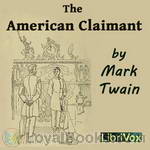 The American Claimant
The American Claimant
The American Claimant is an 1892 novel by American humorist and writer Mark Twain. The story focuses on the class differences and expectations of monarchic, hierarchical Britain and the upstart, "all men are created equal" America. Twain wrote the novel with the help of phonographic dictation, the first author (according to Twain himself) to do so. This was also (according to Twain) an attempt to write a book without mention of the weather, the first of its kind in fictitious literature. Indeed, all the weather is contained in an appendix, at the back of the book, which the reader is encouraged to turn to from time to time. | |
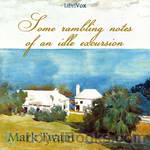 Some Rambling Notes of an Idle Excursion
Some Rambling Notes of an Idle Excursion
Written for the Atlantic magazine in 1877, this is a collection of stories about a trip Mark Twain made with some friends to Bermuda. It contains fascinating descriptions of Bermuda the island, and some of its people as well as an explanation of why Bermuda's houses are "so white". | |
By: Mary Keith Medbery Mackaye (1845-1924) | |
|---|---|
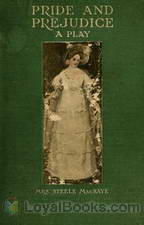 Pride and Prejudice: A Play
Pride and Prejudice: A Play
Pride and Prejudice, a comedy of manners and marriage, is the most famous of Jane Austen's novels. In this dramatic adaption by Mary Keith Medbery Macakaye some liberties are taken with the storyline and characters, but it is still a fun listen or read. Perhaps a good introduction for someone not ready to tackle the complete novel ~ and for the reader familiar with the work, a laugh can be had at the changes that were made in order to adapt it to the stage | |
By: Molière | |
|---|---|
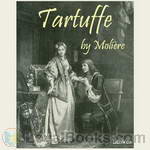 Tartuffe
Tartuffe
Jean-Baptiste Poquelin, known by his stage name Molière, was a French playwright and actor who is considered to be one of the greatest masters of comedy in Western literature. Among Molière's best-known works is Tartuffe or The Hypocrite, written in 1664. Though Tartuffe was received well by the public and even by Louis XIV, its popularity was lessened when the Archbishop of Paris issued an edict threatening excommunication for anyone who watched, performed in, or read the play.Tartuffe, a pious fraud who pretends to speak with divine authority, has insinuated himself into the household of Orgon... | |
By: Moliere (1622-1673) | |
|---|---|
 The Imaginary Invalid
The Imaginary Invalid
The Imaginary Invalid is a three-act comédie-ballet by the French playwright Molière. It was first performed in 1673 and was the last work he wrote. The plot centers around Argan, the 'imaginary invalid' who is completely dependent on his doctors and wants to marry his daughter to a doctor against her will, so that he will always have medical care freely available to him. In an ironic twist of fate, Molière collapsed during his fourth performance as Argan on 17 February and died soon after. | |
By: Molière (1622-1673) | |
|---|---|
 Amphitryon
Amphitryon
"The history of Amphitryon and Alcmene, or rather the myth of the birth of Hercules, is certainly very old, and is to be found in the literature of different nations." Under Moliere's touch, it becomes "One of the most charming and natural comedies composed in French verse.... Sprightliness and vivacity abound in this comedy...." - Summary by Translator Henri Van Laun Cast list: Mercury, in the form of Sosia: Nemo Night: Eva Davis Jupiter, in the form of Amphitryon: Larry Wilson Mercury, in the... | |
 Princess of Elis
Princess of Elis
In the month of May 1664, Louis XIV entertained the Queen-mother, Anne of Austria, and his own wife , Maria Theresa, with a brilliant and sumptuous fete at Versailles.... The second day was distinguished by the representation of The Pricess of Elis [by Moliere].... The Princess of Elis, a comedy-ballet, was intended to represent the struggle between the affections of the male and female sex, a struggle in which victory often remains with the one who seems the furthest from obtaining it.... The author's natural flow of wit and humor was checked by the necessity of accommodating himself to the conventionalities of courtly propriety... | |
 Two Pastorals: an Heroic and a Comic
Two Pastorals: an Heroic and a Comic
Moliere, on the way to the Ballet of the Muses, a court festival, started to write a new Heroic Pastoral. "He chose for his subject a similar one to the history of Florizel and Perdita in Shakespeare's Winter's Tale…. The charm of his writing, the exquisite delicacy of the sentiment, and the freshness of the pastoral scenes, cause us to regret that Moliere wrote only the first two acts of this play and never finished it." Though it was performed this way in Dec 1666 - so maybe there is enough here to enjoy... | |
By: Nathan Field (1587-1620) | |
|---|---|
 Amends for Ladies
Amends for Ladies
Amends for Ladies falls within the genre of Jacobean city comedy. Three women debate which has the better lot: a maid, a wife, or a widow. Lady Honour, the maid, is loved by her servant, Ingen, and disguises herself as a boy to become servant to him. Lady Perfect, the wife, is suspected by her husband, Love-all, of infidelity; Love-all tries to trap his wife by having his devious friend, Subtle, seduce her. A young citizen, Bold, disguises himself as an old woman to enter into the service of the widow, Lady Bright, in the hopes of gaining access to her bed... | |
By: Nicholas Udall (1505-1556) | |
|---|---|
 Ralph Roister Doister
Ralph Roister Doister
| |
By: Noël Coward (1899-1973) | |
|---|---|
 Young Idea
Young Idea
A Comedy in Three Acts The Young Idea is a play about two siblings, Gerda eighteen and Sholto twenty-one, who attempt to engineer the reconciliation of their divorced parents. It is full of laughs, love-triangles, and a lot of DRAMA! - Summary by Ambsweet13 Cast List: George Brent: dgulinoGerda : Amanda MehlSholto: BucksawJennifer: JennPrattCicely: Claire ButlerPriscilla Hartleberry: JennPrattClaud Eccles: skypigeonJulia Cragworthy: ambsweet13Eustace Dabbit: Matthew ReeceSibyl Blaith: Jody LebelRodney Masters: Mike ManolakesHuddle : Larry WilsonHiram J. Walkin: skypigeonMaria : April6090Stage Directions: ToddHW Edited by: ambsweet13 and David Olson Proof Listening by: superk and Yangxu | |
 Hay Fever
Hay Fever
In this delightful farce/comedy of manners, the eccentric and theatrical Bliss family invites four hapless guests to their English country house for the weekend. Hijinks ensue. - Summary by WendyKatzHillerCast List: Judith Bliss: WendyKatzHiller David Bliss: ToddHW Sorel Bliss: Jenn Broda Simon Bliss: Tchaikovsky Myra Arundel: Kelly S. Taylor Richard Greatham: Mike Manolakes Jackie Coryton: Jvisi Sandy Tyrell: CassiopeiaSparks Clara: C. Roxanne Maxwell Stage Directions: Jim Locke | |
By: Oscar Wilde (1854-1900) | |
|---|---|
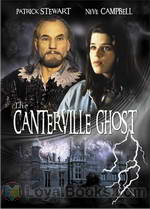 The Canterville Ghost
The Canterville Ghost
An American diplomat's family moves into an ancient stately mansion. They're warned by the owner that it is haunted by a most horrifying and gruesome spirit who had once cruelly murdered his own wife. The story progresses with creaking floor boards, mysterious passages, dark attics, clanking chains, and weird howling. Yet, the reader is totally unprepared for Oscar Wilde's brand of tongue in cheek humor as he takes all the ingredients of a traditional ghost story and turns it on its head, and creates a hilarious parody instead of a morbid saga! The Canterville Ghost was the first of Oscar Wilde's short stories to be published... | |
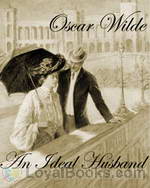 An Ideal Husband
An Ideal Husband
This story opens at a fashionable dinner party in Sir Robert Chiltern's home in the heart of London's stylish Grosvenor Square. One of Lady Chiltern's old school-friends, Mrs. Cheveley, a woman with a dubious past, accosts Sir Robert and threatens to expose a financial crime that he had once participated in, unless he agrees to finance a fraudulent construction project that she's promoting. Lady Chiltern is astounded when her husband who had been the severest critic of this project suddenly begins to speak in its favor... | |
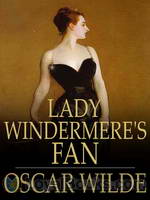 Lady Windermere's Fan
Lady Windermere's Fan
Lady Windermere’s Fan: A Play About a Good Woman is a four act comedy by Oscar Wilde, published in 1893. As in some of his other comedies, Wilde satirizes the morals of Victorian society, and attitudes between the sexes. The action centres around a fan given to Lady Windermere as a present by her husband, and the ball held that evening to celebrate her 21st birthday. | |
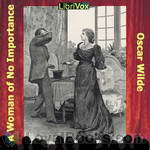 A Woman of No Importance
A Woman of No Importance
A Woman of No Importance is a play by Irish playwright Oscar Wilde. The play premièred on 19 April 1893 at London's Haymarket Theatre. It is a testimony of Wilde's wit and his brand of dark comedy. It looks in particular at English upper class society and has been reproduced on stages in Europe and North America since his death in 1900. | |
By: Owen Wister (1860-1938) | |
|---|---|
 The New Swiss Family Robinson
The New Swiss Family Robinson
A parody of its famous predecessor, this short piece was written by Owen Wister for the Harvard Lampoon | |
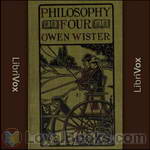 Philosophy 4: A Story of Harvard University
Philosophy 4: A Story of Harvard University
Owen Wister's wry humor enlivens this comedic story of three sophomores during exam week at Harvard. | |
By: P. G. Wodehouse (1881-1975) | |
|---|---|
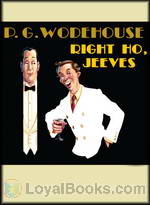 Right Ho, Jeeves
Right Ho, Jeeves
If you're encountering the zany Bertie Wooster and his exceptionally astute Man Friday, Jeeves, for the first time, be assured that you're embarking on a lifetime of fun and laughter! On the other hand, for eternal Wodehouse fans, Right Ho Jeeves provides more glimpses of the delightful world created by one of the best loved English writers. It is the second in the series of Bertie Wooster and Jeeves novels and features some of the regular characters of Brinkley Court, the country seat ruled over by Bertie's much-loved Aunt Dahlia... | |
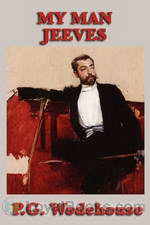 My Man Jeeves
My Man Jeeves
First published in 1919, My Man Jeeves is a collection of short stories featuring the well known fictional characters Jeeves and Bertie Wooster. The compilation consists of eight stories, of which four feature the popular duo while the other four stories feature Reggie Pepper, an early model of Bertie Wooster. Set in the early 20th century, the stories carry much humor, wit, and charming mischief as the characters seem to attract trouble wherever they go. Wodehouse sets the stories in the early 20th century and allows the audience to enter the world of the upper-class establishments, and experience the many awkward situations the characters find themselves in... | |
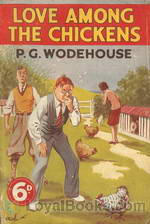 Love Among the Chickens
Love Among the Chickens
A young, but not too brilliant writer is conscripted by a ne'er-do-well friend to help out on a chicken farm in remote Dorset. While traveling to the country, the writer encounters a lovely young girl and her academician father on the train. He is delighted to discover that she is reading a copy of his latest book. In the countryside, he also discovers that the professor and his daughter are neighbors. However, over dinner one night, he gets into an acrimonious debate with the elderly scholar who storms out, furious with his daughter's potential suitor... | |
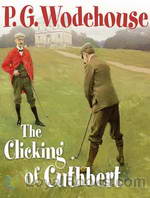 The Clicking of Cuthbert
The Clicking of Cuthbert
The first of two books that he wrote on golfing themes, The Clicking of Cuthbert by PG Wodehouse sparkles with typical Wodehousian wit, humor and general goofiness! An avid golfer himself, Wodehouse published the ten stories in this volume in 1922. In 1924, an American edition titled Golf Without Tears was published. Since then it has enjoyed undimmed popularity among both Wodehouse fans and golfing enthusiasts. Nine of the stories contained in this book are narrated by the Oldest Member, a character who has become a cult figure among Wodehouse fans... | |
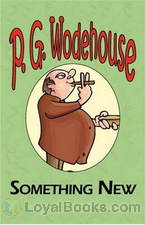 Something New
Something New
When the absent-minded Earl of Emsworth wanders off with the pride of his scarab collection, American millionaire J. Preston Peters is willing to pay $5000 to the person who can get it back for him. Discretion is necessary since Peters’ daughter is engaged to Emsworth’s son. Joan Valentine and Ashe Marson both decide to go after the reward—she as Aline Peter’s ladies maid, and he as Mr. Peter’s valet—and they all end up at Blandings Castle. But is it possible for anyone to steal back the scarab with The Efficient Baxter ever vigilant? This is, IMHO, one of Wodehouse’s funniest novels. –Debra Lynn | |
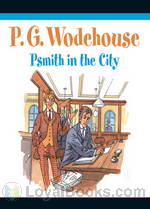 Psmith in the City
Psmith in the City
Mike’s dream of studying and playing cricket at Cambridge are thwarted as his father runs into financial difficulties. Instead, Mike takes on the job of clerk at the “New Asiatic Bank.” Luckily, school friend Psmith, with his boundless optimism and original views, soon joins his department, and together they endeavour to make the best of their new life in London. | |
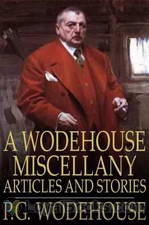 A Wodehouse Miscellany; Articles and Stories
A Wodehouse Miscellany; Articles and Stories
Sir Pelham Grenville Wodehouse was an English comic writer who enjoyed enormous popular success for more than seventy years. Best known today for the Jeeves and Blanding Castle novels and short stories, Wodehouse was also a talented playwright and lyricist who was part author and writer of fifteen plays and of 250 lyrics for some thirty musical comedies. | |
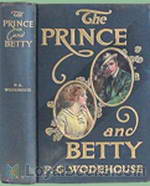 The Prince and Betty
The Prince and Betty
The Prince and Betty is a novel by P. G. Wodehouse. It was originally published in Ainslee's Magazine in the United States in January 1912, and, in a slightly different form, as a serial in Strand Magazine in the United Kingdom between February and April 1912, before being published in book form, in the UK only, by Mills & Boon, London, on 1 May that year. A substantially different version, which incorporated the plot of Psmith, Journalist, was published in the US by W. J. Watt, New York on 14 February 1912, and is the only version now widely available... | |
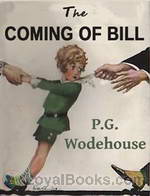 The Coming of Bill
The Coming of Bill
The Coming of Bill tells the story of Kirk Winfield, his marriage to Ruth, and their child called Bill. Bill's upbringing is threatened by the interference of Ruth's busybody writer aunt, Mrs Lora Delane Porter. | |
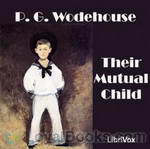 Their Mutual Child
Their Mutual Child
Their Mutual Child (aka The Coming of Bill and The White Hope) is full of the loveable characters, preposterous situations, and opportunities to chuckle, if not outright laughs, that we expect from PG Wodehouse. It lacks the frantic slapstick of some Wodehouse comedy, but has a quieter more reflective humour. Kirk, the erstwhile hero, is a typical Wodehousian hero. At the beginning of the story, he is thoroughly likeable, a healthy, but a somewhat weak and malleable fellow. He dabs at beings a painter for a living, and runs with a gang of hangers-on, who sponge off him... | |
By: Peter Newell (1862-1924) | |
|---|---|
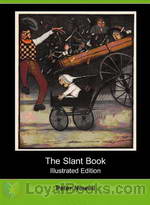 The Slant Book
The Slant Book
The Slant Book is literally the shape of a parallelogram, with the spine of the book running down one side. When opened, facing pages form a “V” shape. All the pictures on the slanted recto pages show a way-too-precocious infant in a carriage [the "go-cart" of yesteryear] racing downhill who has somehow gotten away from his nanny, gleefully creating havoc all along the way! The facing verso pages contain two stanzas of commentary on the charming –if alarming!– illustrations. This book pioneered the “special format” children’s literature of today, such as pop-up books or cutout books like Eric Carle’s The Very Hungry Caterpillar... | |
By: Pierre Beaumarchais (1732-1799) | |
|---|---|
 Follies of a Day; OR, The Marriage of Figaro (English)
Follies of a Day; OR, The Marriage of Figaro (English)
This is Thomas Holcroft's English translation, obtained by attending Pierre Beaumarchais' French play nine times in Paris during its original official staging in 1784. Beaumarchais' play was the basis for Mozart's 1796 opera, and is a satire about lovers' misdoings and French society. Because of its rebellious themes, presented during the troubling times leading up to the French Revolution, Beaumarchais had a very difficult time getting his play past the censors. Once staged, the play was enormously popular with audiences, including the aristocracy despite their understanding of the underlying themes... | |
 Barber of Seville
Barber of Seville
Count Almaviva's heart is stolen when he lays eyes on Rosine, but he worries that she will only love him for his money. Can Figaro help him? This comedy is the first play in Beaumarchais' Figaro trilogy. It was written in 1773, but because of political and legal problems, Beaumarchais could not stage the play until 1775. The Barber of Seville was adapted into at least five operas, the best-known being by Rossini. The other plays in the trilogy are The Follies of a Day: or the Marriage of Figaro and The Guilty Mother... | |
By: Richard Brinsley Sheridan (1751-1816) | |
|---|---|
 The Rivals
The Rivals
The play is set in Bath in the 18th century, a town legendary for conspicuous consumption and fashion at the time. Wealthy, fashionable people went there to "take the waters", which were believed to have healing properties. The plot centres on the two young lovers, Lydia and Jack. Lydia, who reads a lot of popular novels of the time, wants a purely romantic love affair. To court her, Jack pretends to be "Ensign Beverley", a poor officer. Lydia is enthralled with the idea of eloping with a poor soldier in spite of her guardian, Mrs... | |
 School For Scandal
School For Scandal
Richard Brinsley Sheridan's comedy was first performed in 1777 and focuses on the intrigues and scandals of the British upper classes. Lady Sneerwell wants to marry Charles Surface, while Joseph Surface wants to marry Maria, an heiress and ward of Sir Peter Teazle. Maria, however, prefers Charles over Joseph. In order to detach her from Charles, Lady Sneerwell and Joseph spread rumors about an affair between Charles and Lady Teazle, Sir Peter's new young wife. Meanwhile, Sir Oliver Surface, newly returned from the East Indies, assumes various disguises to test his nephews' characters. Misunderstandings, mistaken identities, gossip, and bad behavior abound in this uproarious comedy. | |
By: Richard Harding Davis (1864-1916) | |
|---|---|
 Miss Civilization
Miss Civilization
Miss Civilization, a one act comedy, tells the story of a young woman who matches wits with three burglars attempting to rob her house. | |
By: Richmal Crompton (1890-1969) | |
|---|---|
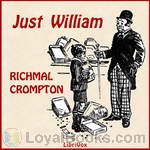 Just William
Just William
William is a mischievous eleven year old who is puzzled by the adult world, which is no less puzzled by him. The humor is gentle and pleasing. The series of books is better known in the United Kingdom than in the U.S. ( | |
By: Robert Benchley (1889-1945) | |
|---|---|
 Love Conquers All
Love Conquers All
Sixty-three essays on a variety of topics as wide apart as Family Life in America, Opera Synopses, Bigamy, International Finance and many more, Love Conquers All by Robert Benchley strangely enough does not touch upon romance at all! However, these delightful notes provide hours of browsing pleasure for young and old readers alike. Robert Benchley was a well-known humorist and newspaper columnist, radio and television presenter, actor, scriptwriter and broadcaster. He is also credited with creating the first ever television entertainment show and one of his iconic short films, How to Sleep won an Academy Award in 1936... | |
By: Robert Copland (fl. 1515) | |
|---|---|
 Jyl of Breyntfords Testament
Jyl of Breyntfords Testament
Introduction - This is a collection of ten comic pieces from the 16th century and earlier, as compiled and edited by Frederick Furnivall for private circulation in 1871. Only the first is by Copland. (Introduction by Grant Hurlock) | |
By: Robert Williams Wood (1868-1955) | |
|---|---|
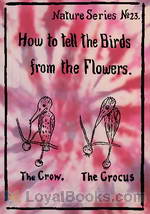 How to Tell the Birds from the Flowers
How to Tell the Birds from the Flowers
How do you tell apart a parrot from a carrot? A plover from a clover? A bay from a jay? Although there are several ways of differentiating, R. W. Wood’s use of pun and rhyme is one of the most entertaining! | |
By: Ronald Firbank (1886-1926) | |
|---|---|
 Princess Zoubaroff
Princess Zoubaroff
The Princess Zoubaroff is a witty, subversive, and unbelievably suggestive play, far ahead of its time. Through razor-sharp dialogue and outrageous scenarios, Ronald Firbanks takes aim at all of the sacred cows of polite English society: matrimony, motherhood, religion, and sexuality. Enid and Eric are newlyweds, although neither is particularly happy with this new arrangement. While honeymooning at their friends’ vacation home in Florence, Eric and his friend Adrian leave for the mountains. The... | |
By: Royall Tyler (1757-1826) | |
|---|---|
 The Contrast
The Contrast
| |
By: Saki (1870-1916) | |
|---|---|
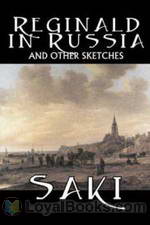 Reginald
Reginald
Saki was the pen name of the British author Hector Hugh Munro (1870 – 1916). His witty, biting and occasionally odd short stories satirised Edwardian culture. Saki is considered a master of the short story and has been compared to O. Henry and Dorothy Parker as well as Noel Coward and Oscar Wilde (who clearly influenced Saki). His first collection of short stories, Reginald, was published by Methuen Press in 1904 though these stories first appeared in the ‘Westminster Gazette’. The stories... | |
By: Sinclair Lewis (1885-1951) | |
|---|---|
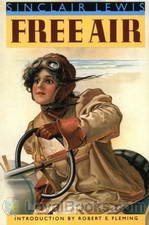 Free Air
Free Air
This road trip novel is set in the early twentieth century and follows the experiences of an aristocratic New Englander and her father as they travel by automobile from Minneapolis to Seattle. She is wooed and won by a noble but simple commoner she meets along the way. Lewis is at his usual wryly humorous self, poking fun at the upper class and treating the common people only slightly better. | |
 Our Mr. Wrenn, the Romantic Adventures of a Gentle Man
Our Mr. Wrenn, the Romantic Adventures of a Gentle Man
"At thirty-four Mr. Wrenn was the sales-entry clerk of the Souvenir Company. He was always bending over bills and columns of figures at a desk behind the stock-room. He was a meek little bachelor--a person of inconspicuous blue ready-made suits, and a small unsuccessful mustache." Mr. Wrenn, however has a rich inner life embellished by his own imagination. When he comes into a modest inheritance, he feels he ought to learn to get out and wander a bit, and then his education begins. He finds life more "interesting", perhaps than he had "imagined". . . (Introduction by Don Jenkins) | |